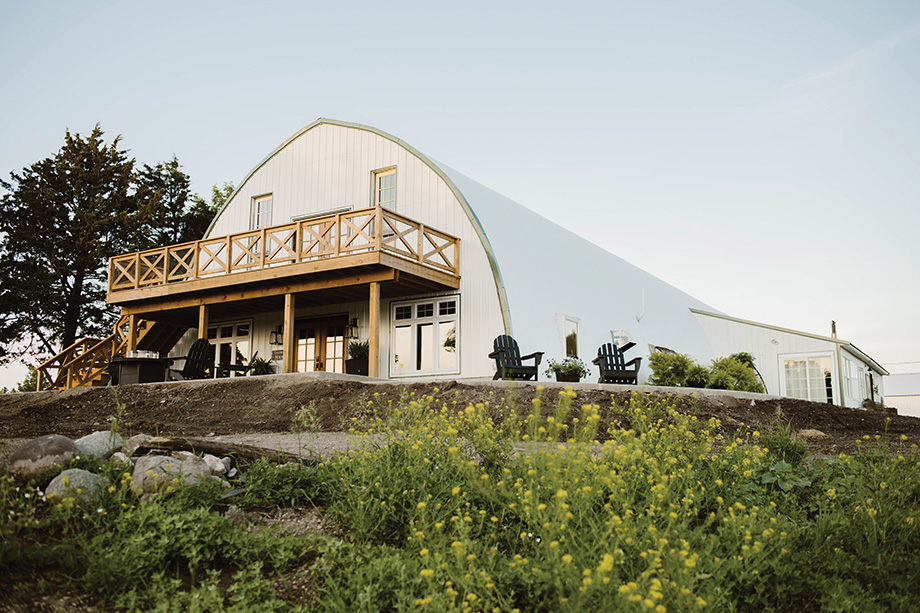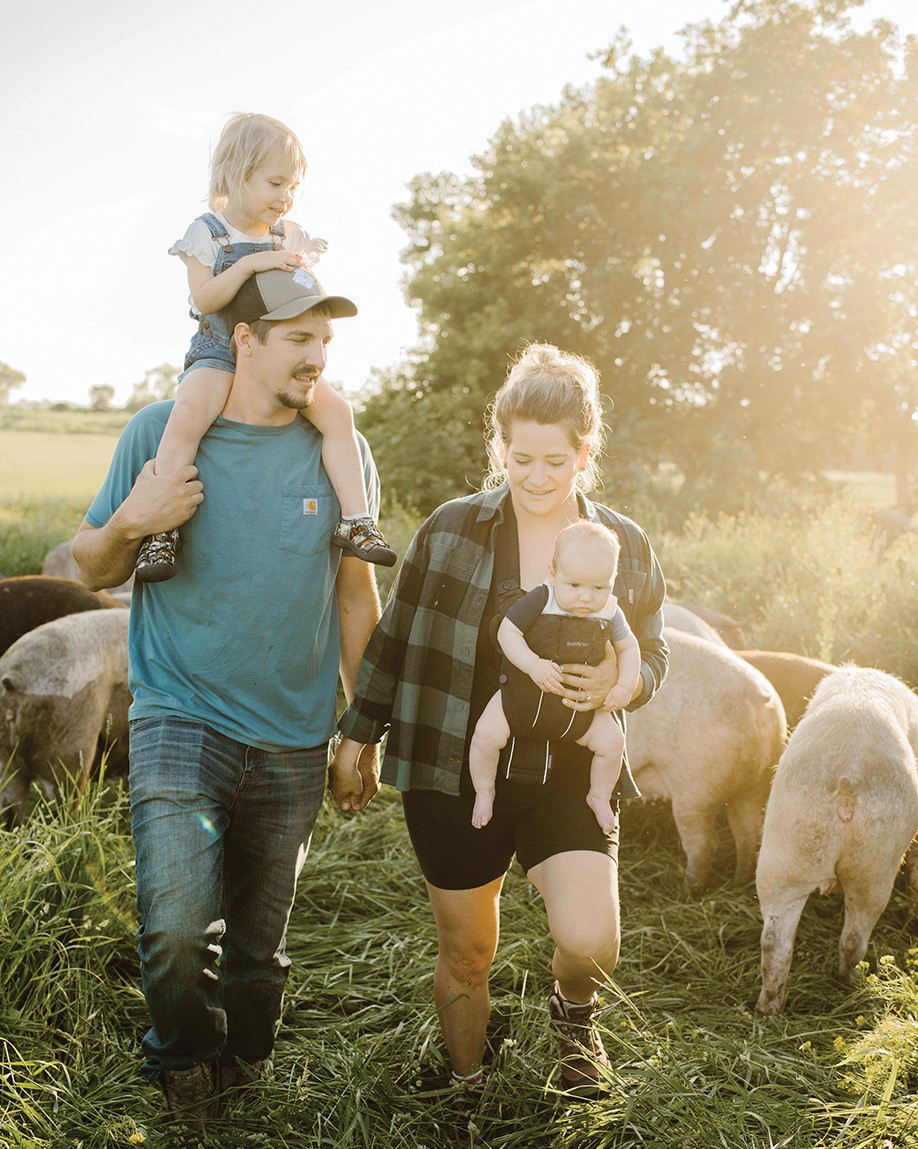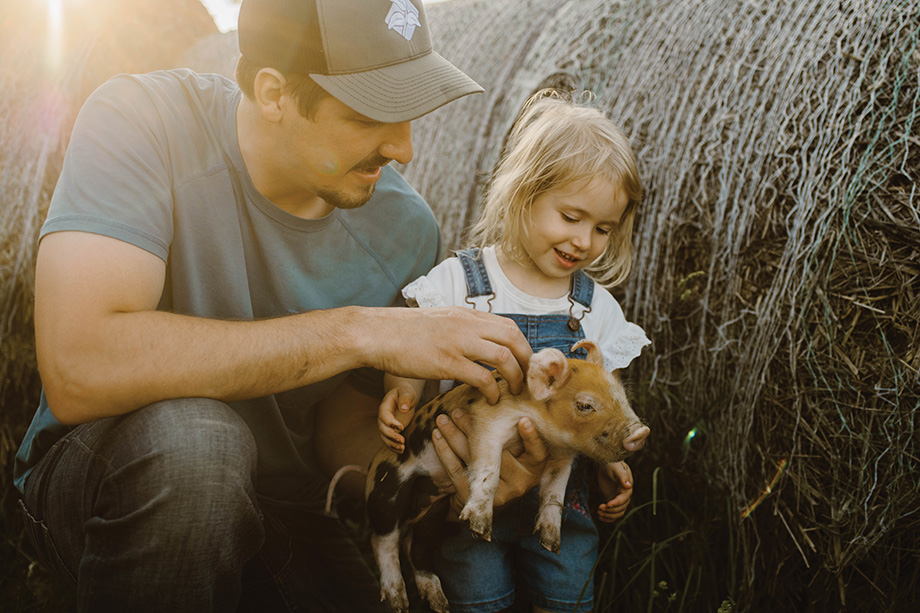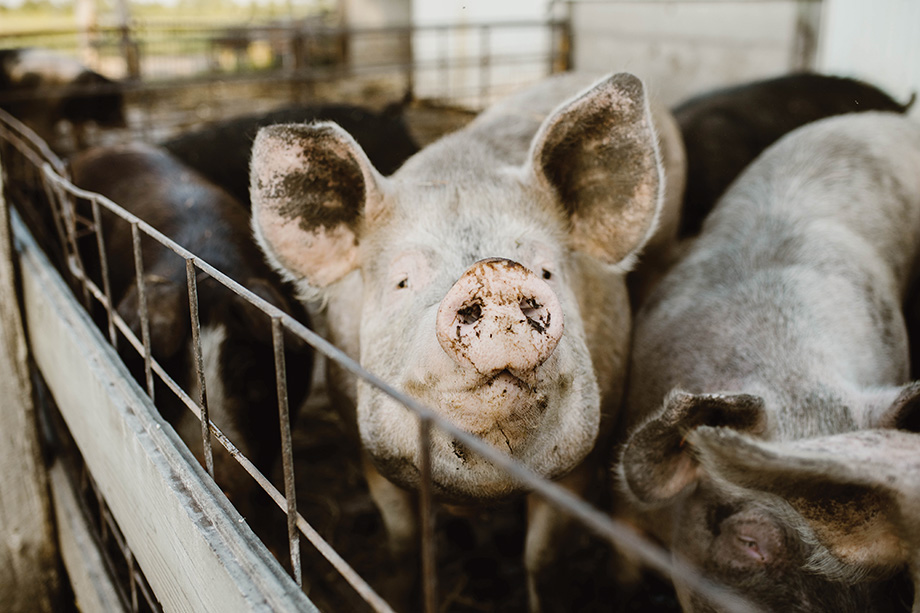
Photos: Mataya Creations
Family-run Belgrade farm offers a chance to experience agricultural life.
As a little girl growing up on a dairy farm in Elrosa, Minnesota, Trisha Zachman has many fond memories of childhood. From looking for kittens among the hay bales to racing her siblings to finish feeding the calves, it’s experiences like these she now aims to give visitors to Feathered Acres Learning Farm & Inn.
“I take these simple memories and show my guests the joy and fulfillment I got from them,” Zachman says. Visitors, who may have never set foot on a farm before their visit, walk away with hands-on farming experiences along with a new understanding of what it takes to bring food from farm to table.
Zachman and her husband, Nolan, acquired a 13-acre plot of land in Belgrade, Minnesota, in 2020 and rented an additional 13 with plans to farm the land and raise a family. But, after restoring the barn on their property, a new idea started to emerge. “I [initially] had no intention of teaching people about farming,” Zachman says. “But people were very curious about where their food comes from. I loved that.”

Nolan and Trisha Zachman and their children, Esther and Burke.
And so, the educational concept behind Feathered Acres Learning Farm & Inn began to take shape.
The Zachmans, who both studied agronomy at North Dakota State University in Fargo, North Dakota, are in the process of becoming a fully regenerative farm. “Regenerative farming is a type of farming that focuses on soil health,” Zachman explains. “Nurturing the soil back to health leads to providing more nutrient dense food. We nurture the whole ecosystem and strive to get it all back in working order. Once our soil and plants are healthy, that leads to healthier animals, water preservation, organic food and helps fight climate change.
“It’s kind of like the old way of farming,” Zachman says. “For me, it just feels so right.”
It’s a notion that resonates with customers, as well. “Feathered Acres Farm is a local favorite in our household,” Jonathan Farr says. “It’s important for our family to support local businesses that prioritize sustainable and ethical practices.”
The Plymouth resident is a regular customer of the farm’s bacon and sausages. “Feathered Acres Farm is the perfect example of a small business that cares about their customers, their animals and the environment. We appreciate their commitment to providing top-notch products that are also environmentally conscious,” Farr says.
But achieving a regenerative farm can be a slow and arduous task. “Farms can’t just become regenerative,” Zachman says. “It’s a five-year process. And the first years tend to be the hardest years.” After starting the farming process, Zachman looked to the property’s old milking barn. “One part was renovated like a hunting shack,” she says. “So, I fixed it up and put it on Airbnb.”
It wasn’t long before they had their first guests. Though she expected to just offer a unique type of lodging, Zachman soon found that their guests wanted more. “We’d be doing chores, and they’d be following us around, asking questions,” Zachman says. “That’s when I started doing tours. People just really loved it.”

Now, Zachman offers visitors a farm- to-table education. “We provide a fun, hands-on farm tour to our guests, which helps explain what regenerative farming is,” she says. “They get to actually take part in some chores and see the why and how of what we do. We also teach them about the farm life that not many people get the chance to experience—the precious opportunity to care for animals and the land with your family.”
Zachman loves that people are taking an interest in agricultural life and want to know more about where their food comes from. Kathy Halloran hasn’t stayed at the farm yet, but the Wayzata resident is a regular customer of the farm’s pork chops, sausage and eggs. She says she appreciates the vision the Zachmans have.
“I love knowing that the products come from healthy, well cared for animals, and I appreciate that Trisha and Nolan are creating a regenerative farm with educational classes offered to the public as well as vacation rentals where you can relax and wind down,” Halloran says. “Feathered Acres Farm has a vision that I am happy and excited to support.”
That vision includes the eventual addition of sheep to their existing menagerie of pigs and chickens, a second rental and a future community space in the renovated barn where Zachman hopes to hold larger classes. “I love how we’re starting to do something different on our farm,” Zachman says. The farm tour remains its most popular offering, although it also hosts composting and gardening classes. In addition to a standard stay in their lodgings, Feathered Acres Learning Farm & Inn offers packages for everything from birthday parties and celebrations of life to bachelorette weekends and family photos.

Looking for something they don’t offer on the website? “Just ask,” Zachman says. “We don’t have it [fully] figured out yet. We’re trying our best for that perfect harmony.”
Four Principles of Regenerative Farming
- Plant diversity: Focusing on planting many native plants – the more diversity, the healthier the soil is.
- Soil armor: Keeping the soil covered at all times to help with weeds and to protect from the elements like wind erosion.
- Living roots: Maintaining a constant presence of living roots through cover crops feeds the soil and takes carbon out of the air. This helps feed the billions of microbes in the soil and help maintain moisture in the soil.
- Integrate livestock: Allowing livestock to move from field to pasture, gleaning and grazing on a multitude of plants which fertilize the land with their manure. Following that animal with chickens which eat what was left behind.
Feathered Acres Learning Farm & Inn
38975 County Road 32, Belgrade; 320.429.1913
Facebook: Feathered Acres Learning Farm & Inn
Instagram: @featheredacres_farm_inn





















